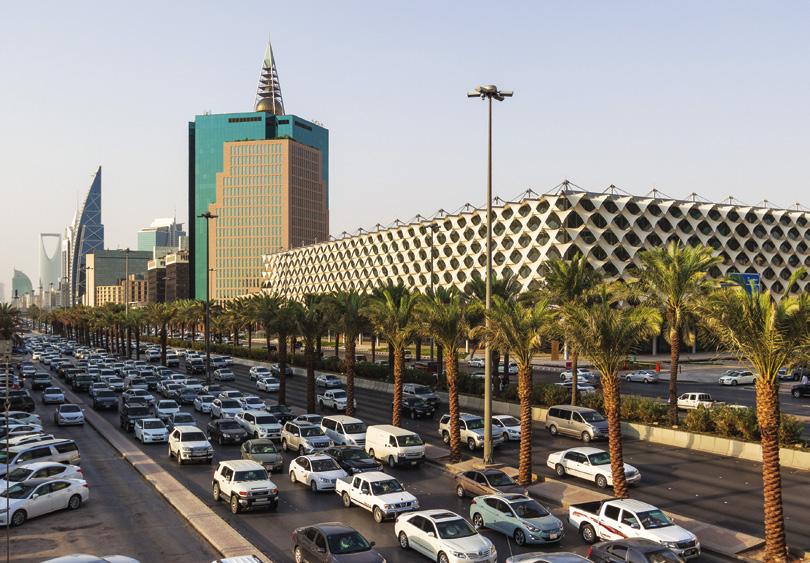
14 minute read
KSA: BEYOND 2020
SAUDI ARABIA: LOOKING BEYOND 2020 Vishal Pandey, director, Glasgow Consulting Group, looks at the trends shaping the GCC’s largest auto-market

Whichever way you look at it, the Saudi Arabian automotive market remains the biggest in the GCC but it is also one that is undergoing enormous change.
As ever, the Saudi government will dictate the direction it will take but, even as we scramble to understand the ramifications of the Covid-19 pandemic, it is clear that the market holds a lot of promise for consumers, fleets and manufacturers alike.
Vishal Pandey, Director, Glasgow Consulting Group recently used Automechanika Dubai’s series of webinars to de-mystify the occasionally confusing country and explore the trends that will shape it for years to come.
He started by giving a short overview of where it stands in terms of production and sales.
“Saudi Arabia is the biggest in the GCC for auto parts and passenger car market sales – 60% of the total market in the GCC is Saudi Arabia,” he began.
“A large part of this business works on imports and as we all know, there is very limited manufacturing in Saudi despite it trying to create an automotive-specific cluster. It has been able to attract Commercial Vehicle assembly lines, there are at least three in Saudi Arabia currently, but there is no passenger car assembly. That means there is a large automotive aftermarket.
“These automotive economic clusters do want to attract anything automotive into the country. While that is a nice thing how do you actually translate those things will be seen over time. We have seen over the last one and a half years women come into the into the driving space. This is good news because that means there are more licenses issued; which which means there are more driving schools; as a result, there are more cars on the road; and that leads to higher aftermarket purchases.”
According to Pandey, the Coronavirus has unfortunately come at a time when the effective opening up of the market to half the population was at odds with the government removing subsidies on vehicle purchases. This was already forcing a large shift in buying habits in the Kingdom even before pandemic struck.
“Over the last two years, new car sales were dropping from 550,000 units in 2016 to around 240,000. Coming into 2020, we were looking for a slight recovery and then we were hit. Based on our analysis and research, we see a dip because we have basically lost three months of car sales window across the board - and with several other factors such as people postponing their buying decisions - we believe the drop in overall sales is going to be 40 percent.”
Pandey says the current outlook couldn’t be more different from the one which played out in the middle of the last decade.
“In 2015-16, the ratio of new cars sold in Saudi Arabia was; for every four new cars bought: there were three old cars which were transacted. Now fast-forward three years to 2019, this basically stands at four new cars for eight used cars being transacted. That is a huge shift. The government has taken away certain allowances (which leads to) pressure on your job and your cost of living expenses is going up, etc.
“There is there is an increased willingness of people trying to use old cars. The pie remains the same but there are reduced new car sales.”
For those in the aftermarket, he argues, this could be a boost – albeit in the long term: “Aftermarket component and sales continue to grow so that is an interesting observation moving ahead.”
The consultant added that there has been a double hit on the market. With low oil prices dogging the Saudi economy, the government surprised some industry observers when it chose to raise VAT in July.
“When we heard that the VAT rate was increasing from 5 to 15%, it came as a shock to many but there were certain reasons which were given by the ministry and I think that’s the way it’s going to be. So starting first of July we see that going up to 15%, the pressure from oil prices continues and that has a direct link to the government’s budgets and spending.”
“I think that decision was a very abrupt decision taken but there were reasons which were justified. I think a lot of people had done their maths and argued that we were lagging (other GCC countries) behind and that there’s a deficit to cover up. From a market reaction point of view, it came as a surprise. It was announced during the covid times. But I think this is not government policy – whether it’s right or wrong, that’s for a pure economist to answer but I think 5% was good. It will be interesting to see how it pans out.”
The increase in VAT will at least
ease government fiscal concerns and Pandey welcomed Saudi’s announced stimulus package of around $31 billion as a positive gesture.
“A lot of countries across the region announced various initiatives and this was part of the same. The government also announced that they’re going to support by paying the private sector employees about 60 percent of their salary, again a positive gesture,” he explained.
Digging through the retail data, Pandey says the easing of restrictions by June and the partial re-opening of showrooms followed a

three-month period where footfall was down by 80% and new car sales were down by 60%.
He remarked: “Due to what is happening in the landscape, there is a hit on the consumer segment. So your decision to buy a new car has been either it’s been stopped; curtailed; or postponed. Obviously, the curbs around movement has had an impact on shared mobility; servicing and your periodic maintenance comes down and your spare parts sales are also down as a result.
“I’m driving less; your whole life has come to a standstill; and you’re trying to reboot your life. You go out only to do your

BIG HIT TO SALES, STRONG RECOVERY
Sales and car use saw dramatic drops at the peak of the COVID-19 lockdown but could soon back bounce in 2021 to levels seen in 2019.

GROWING ECOMMERCE LIGHTS THE WAY
Saudi Arabia is the world’s third fastest growing ecommerce market. This is already having a profound effect on the automotive sector. essentials, right? So your overall use of the car comes down and thus, your need for spare parts decreases. We see a 24% dip now, but we will see a recovery happening in 2021 to go back to the same 2019 levels.”
Expanding on his analysis of what happens as the peak of Covid outbreak passes, he believes that Saudi residents will re-shape their lives to fit with the new normal. This in turn has a number of ramifications for the auto industry.
“Your travel will be viewed differently. Your holidays will be viewed differently. So we think mobile services and on demand services will see a huge surge post-covid. We will obviously see more emphasis on hygiene, If I was to take a Rent-A-Car, there will be well laid out processes by which you can rent a car and all the hygiene factors will come into play. Contactless services will obviously find more emphasis and more importance.
He continued: “Ecommerce as we have already seen in Saudi Arabia already has one of the highest penetration – the third highest – in the world. We have seen over the last three to four years that there is this new trend even in the automotive space. There are some new brands with different aftermarket service offerings, ranging from your tyre change to oil change to on call service.
“New business models will emerge as a result. You will find more and more companies trying new things to more penetrate into the e-commerce space.”
While he believes that the Saudi Arabia auto sector and the related will be held back by a muted consumer sentiment for the remaining Q3 and Q4 and 2020, he believes that Chinese brands could emerge at the forefront of a recovery in 2021.
“Saudi families want two to three to four cars. So, one of the emerging trends will see more Chinese Brands grow into prominence. Families will want to take their third and fourth car as a Chinese brand because it’s literally half the price.”
He suggests that Chinese firms should begin to prepare for this rise in interest.
“If there is a Chinese brand which has not been able to deliver good aftersales service now is the time for them to get their act together. This will depend on the local dealerships and working together in ensuring that you are able to give a good customer journey; a good experience to the customer.”

Glasgow Consulting Group conducted a study early in the year to understand the Saudi consumer.
“The Saudi customer is just like any customer. It’s like all of us in the GCC – or globally – your expectations are high. You want a good level of client engagement service. You want to be treated with a fair pricing. Everyone is looking for a good offer. You are enticed by discounting.
“There will be various promotions you will see coming going forward from the principal side, the OEM side, and the distributor with more and more strategies applied that offer better service deliveries because this is what the consumer is looking at.”
Pandey believes that concerns of safety and hygiene will accelerate demand for cashless transactions.
“Generally, Saudis travel long distances. You travel from Jeddah to Riyadh on the road. Those travels will come back slowly over time; people will have to get their confidence back. Right? These trends (safety and hygiene) will slowly change modes of payment. We were a very cash driven country but now that is transitioning to a much more contact-less economy. Whoever takes that plunge or whoever acts fast and gives those various tools and platforms is going to succeed in the market. We will obviously see a lot of apps coming it. There are many clients we are working with currently that are trying to experiment on delivering various (contactless) automotive after service platforms.”
“Post-Covid, how you communicate with your customer and how you provide the right messaging for your great product becomes very relevant. I think, at the end of the day, any brand product or service which emerges as the winner will be somebody who can champion this whole customer experience thing.”
“Service delivery is going to be key going forward as will how you engage and talk to your customer.”
A RAPIDLY CHANGING MARKET
Pandey says the Saudi Arabian market will be shaped by changing consumer habits.

60%
of the total auto part and passenger car market in the GCC is Saudi buyers

Returning to his earlier point, the automotive industry as a whole needs to be consider its e-commerce and digital strategy for the market.
“Its here to stay,” he enthused. “We heard a few weeks back, Audi announce in the Middle East that they want car sales, even in Saudi Arabia, to all online. The full customer journey.”
This he adds that this trend presents a challenge for the auto-industry.
“Any stakeholder in the whole equation needs to think what can I do to engage and create interest with my with my target audience? One of the problems with the Amazons of the world is fixed costs. So, how do I, as an online player, give confidence to my end customer that whatever we are selling is checked, is ratified and that we have a particular mechanism in place that avoids any fake items being sold. That’s the one of the challenges which we come across in the online channel.
“And then you have the dealerships coming up with more offers more discounts. They are running car clinics. They are taking about the hygiene factors. They are talking about the new surfaces you want to put inside the car (because the current surface, if you were to leave certain hand marks, it stays on). With Covid everything within the car comes under scrutiny. You have to look at in a very pragmatic way. How do I change it? How do I make it better? How do I make it safer?”
One source of inspiration he suggests should be how the auto-industry is recovering in Asia, particularly in China.
“The recovery of these countries have been faster. These are certain private players from Gill in China to the South Korean Brands (that are worth looking at) What are they doing? How are local dealerships a helping to build customer confidence.”
Coming to a close, Pandey suggested that the changing Saudi market will mean everybody will have to reinvent their business model.
“I think the consumer expectations needs and wants, and how you shortlist, how you shop… all of that has changed now across both the B2C and the B2B space. I think businesses need to make adjustments.”
He ends on a note of optimism: “On the more positive side, the UAE and Saudi government have been very proactive. So, a lot of good positive measures have been announced and I think that these are very resilient countries. I definitely think the recovery period timeline in comparison to certain other parts of the world will be much better.”
BLIND OBJECT DETECTION SYSTEM

MONITOR YOUR ASSETS & OPERATIONS 24/7 BEST CERTIFIED SOLUTIONS;
• FUEL MANAGEMENT SYSTEM. • VIDEO SURVEILLANCE. • FLEET MANAGEMENT SYSTEM. • PARKING & ALARM SENSOR. • TANKS GAUGES. • FUEL LEVEL SENSOR. • GPS TRACKING SYSTEM. • TYRE PRESSURE SENSOR.
T. 009716 7430176 F. 009716 7430107
E-mail: mh@creationfms.com Web: www.creationfms.net
A ROBOT RECRUIT
Ford says its new four-legged robot friend is speeding up manufacturing

These four-legged dog-like robots can sit, shake hands and roll over. They also can perform 360-degree camera scans, handle 30-degree grades and climb stairs for hours at a time.
That’s because these pooches are actually 70-pound quadruped robots with distinctly dog-like mobility. They’re part of a Ford manufacturing pilot programme designed to save time, reduce cost and increase efficiency.
Fluffy, the name given by the robot’s handler Paula Wiebelhaus, is one of the two models Ford is leasing from Boston Dynamics, known for creating sophisticated mobile robots. (The other Ford robot is named Spot after the original robot’s name.)
The robots, which Ford is piloting at its Van Dyke Transmission Plant, are bright yellow and easily recognisable. Equipped with five built-in cameras to visualise their surroundings, the robots can travel up to 5 km/h on a battery lasting nearly two hours and will be used to scan the plant floor and assist engineers in updating the original Computer Aided Design.
“We design and build the plant. After that, over the years, changes are made that rarely get documented,” says Mark Goderis, Ford’s digital engineering manager. “By having the robots scan our facility, we can see what it actually looks like now and build a new engineering model.”
Without Fluffy, the update would be far more tedious.
“We used to use a tripod, and we would walk around the facility stopping at different locations, each time standing around for five minutes waiting for the laser to scan,” Goderis recalls. “Scanning one plant could take two weeks. With Fluffy’s help, we are able to do it in half the time.”
The old way also was expensive – it cost nearly $300,000 to scan one facility. If this pilot works, Ford’s manufacturing team could scan all its plants for a fraction of the cost. These cutting-edge technologies help save the company money and retool facilities faster, ultimately helping bring new vehicles to market sooner.
In time, Goderis says, the intent is to be able to operate the robots remotely, programming them for plant missions and receiving reports immediately from anywhere in the country. For now, the robots can be programmed to follow a specific path and can be operated from up to 50 metres away with the out-of-the-box tablet application.
“Fluffy is an amazing manufacturing tool,” said Weibelhaus. “He can do so much more than dance and roll over. We want to push him to the limits in the manufacturing plant and see what value he has for the company.”
NEXT ISSUE: A HEAVY INDUSTRY GETS LIGHTER, TRAILER TECHNOLOGY, THE HUMAN FACTOR IN RENTAL AND MUCH MORE!










